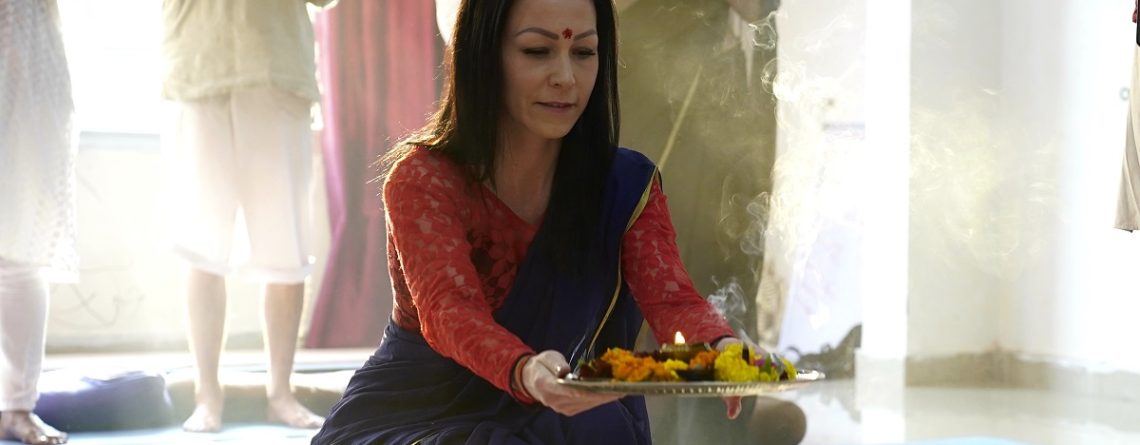7 Things About Spirituality I Learned From a Monk
One of the reasons I decided to go to India to study yoga and meditation was to deepen my understanding of spirituality. I wanted to uncover my blind spots and understand life beyond the psychological process of limiting beliefs and habits.
Part of this study were philosophy classes with a monk. During one of the classes, he said: “Happiness is our true nature.”
It caught my attention and, in a way, provided a sense of hope and curiosity. At that time, I didn’t consider myself a happy person, actually far from it. One of the reasons I came to India was to seek answers about my life I didn’t understand.
I had questions like,
“What is happiness?”
“Is it entirely in my hands?”
“Convinced that I want to be happy, why do I keep missing the mark?”
His classes seem to be the answer to my questions. Often, he spoke with such ease and clarity, in simple terms, yet the meaning of his words was profound.
Here are 7 things about spirituality I learned from a monk that redefined how I live my life.
1. Mind is a tool
Mind is something we have, not who we are. Therefore, our thoughts are not the problem. It’s the identification of what we think that creates a distorted picture of reality.
Let’s say that I have a thought, “I am not good enough.” The thought itself has no meaning unless I give it one. If I choose to identify with it, it becomes real. But if I observe and pass by it without believing it and getting emotionally attached, it will eventually die.
Once you observe you think negatively, try this:
- Pause: this is your opportunity to stop your negative thoughts on its track.
- Observe: remind yourself that thoughts come and go and have no meaning without your contribution.
- Refocus: choose thoughts of gratitude, remember a joyful moment you had during the week, and think of someone you love dearly.
2. Accept what you can’t change
Although we can’t control what happens around us, we can choose how we respond to it from within. What creates suffering is our resistance to what is, not the situation itself.
If we unconsciously react and get emotionally attached, we are overpowered by the situation. However, if we use the power of choice and decide how we process what’s happening around us, we are in control and more prone to respond with calm.
3. Your life is entirely in your hands
We can design our lives exactly the way we want. Although that doesn’t mean everything on the outside will go according to our wishes and desires, how we perceive it and respond to it is.
We are equipped with the power of choice and can always choose what we want to feel and experience.
At first, it felt burdening since I often didn’t choose happiness over judgment or negativity. Eventually, it gave me a sense of empowerment. I realized that I am the person who can create or destroy anything in my life.
That’s when I began to grasp the concept of spirituality.
I realized that although no one can give us happiness, peace, and balance, no one can take it away either unless we give it up.
4. Practice dispassion
By practicing dispassion, we learn to detach from things outside of us. However, dispassion doesn’t mean not caring about the world around us or the people in it, but rather not being defined by them.
We can be fully involved in a task, have a great desire for it to be done well, feel joy while performing it, and still not identify with the result of it. As stated in chapter 4 of the Bhagavad Gita, an ancient Hindu scripture, “The awakened sages call a person wise when all his undertakings are free from anxiety about results.”
5. Align your action with your goals
After I returned from India, I continued my study with a monk virtually since I wanted to deepen my understanding of spirituality. During one of our video calls, I shared with him that I want to become nonjudgmental about people around me. It was a pattern I was working on but felt frustrated with.
He asked me, “Do you want peace and happiness in your life?”
I said, “Of course.”
He then said, “Then you have to align your goals with your actions.”
I always appreciated his caring directness because it gave me the reality check I needed. Although I said I wanted one thing, my behavior didn’t reflect it.
He went on to say, “You must become stubborn if you want to change. You must have a single-minded focus and fight that thing inside you that wants you to pull back. It’s the only way.”
6. Reframe from duality
Duality means we label things as good and bad, right or wrong, nice and ugly while spirituality is about becoming one with the Universe.
When we perceive things as good, our emotional state is high. However, when we perceive things as bad, we become sad, discouraged, hopeless, and even depressed. Living in a world of duality will prevent us from finding balance and inner peace.
Instead of experiencing this emotional rollercoaster of good and bad, we must learn to see things for what they are, without inputting our agenda and preferences into the space.
7. Happiness is our true nature
Underneath the body and the mind lies our true nature. Whether we call it soul, innate intelligence, higher consciousness, or God, it is greater than our psychological process of thoughts, and it doesn’t know survival. It is naturally happy and whole.
You can test it by sitting in a comfortable seat, free from distractions. Close your eyes and become completely still, only focusing on the air coming in and out of your nostrils. If you keep your single focus on the subtle sensation of your breath, you may access, even if just for a second, the beautiful state of tranquility.
This peaceful moment is a time when your psychological process of thoughts and emotions fades into the background. You perceive a sense of stillness which brings joy and happiness into the moment.
We can’t understand it intellectually. We have to experience it from within.
Understanding and applying these 7 principles of spirituality, I came to the conclusion that we are makers of our lives, and we can design them whichever way we want. Although I haven’t master them yet, they have governed my life in the direction I didn’t know existed and feel deeply grateful for.












Leave a Reply